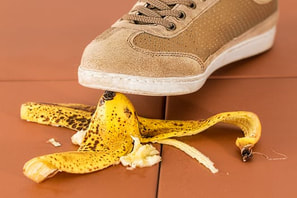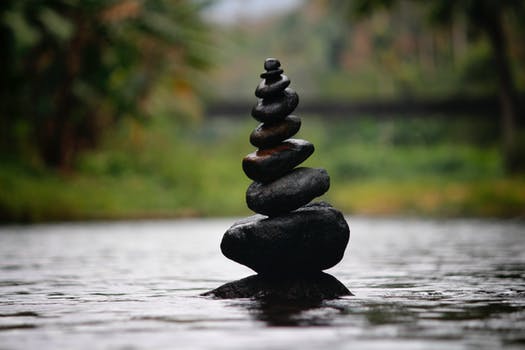|
We're all tired of performing with freedom and ease right? Here are some ways you can interfere with yourself to make sure you never reach your full potential onstage. 1. Take Deep Breaths.We all know how important breathing is not only to your voice onstage but also for physical relaxation and emotional access right? So you want to make sure to sabotage that for sure. The best way to do that is to try and take deep breaths. Wait, huh? Isn't that supposed to help you relax? Not so much. When we try to breath deeply by focusing on the inhale we employ the accessory muscles of the ribs, abdomen and back to pull air into the chest instead of allowing the diaphragm to engage to make space for air deep in the body and back. This means we often get much less air than if we focus on not holding our breath and allowing a gentle exhale, triggering the reflexes that engage the diaphragm and giving a deep, full unforced breath. Plus, whenever you inhale, your heartbeat increases, so by inhaling a lot any stage fright you have is bound to increase and you will probably hyperventilate. FUN!!! 2. Stand Up Straight So You Look Really Confident!Nobody likes a vulnerable actor right? So push that chest out, pull those shoulders back, and make your spine as straight as a Kansas highway. If you follow these instructions, you will come off as super defensive and forced! It's like you have literally put a barrier between you and your audience/scene partners and as you will have frozen the movement of your breath mechanism (see above), you will probably have to push through your performance without feeling a thing all while looking strained and stiff. WHEW GOOD JOB. 3. Just Relax As Much As Possible. It's REALLY IMPORTANT. But Be Cool About it.Never in the history of relaxing has telling yourself to relax has it ever helped anyone to relax. So you should probably tell yourself it a lot in a really judge-y tone! Better yet, just slump. It is the best way to be relaxed. If your neck starts hurting or you notice yourself being short of breath and heavy feeling don't worry--that's what relaxation is supposed to feel like. You should hang out onstage like a boneless cat from a Far Side cartoon--its called being expressive. WHATEVER YOU DO, don't try to find a healthy alternative between slumping and pushing into your body. It can only lead to horrible, horrible success. 4. Get Grounded.Grab the ground with your feet. GRAB IT!!! And better yet, push down through your body like you are trying to break through to the center of the earth. If your knees lock, so much the better--you might even feel like it would be impossible to move if you wanted to! Like these other strategies, you will know if it is working if gets harder to breath. Definitely don't release your knees and ankles, slightly widen your stance, and feel a balance between weight on your heels and toes--it can only end in a supported, free body. 5. Whatever You Are Interacting With Onstage, Stare At It Like Your Eyes Are Lasers and You Want To Melt It Into Oblivion.Really, this is how you know you are acting with intensity--when your eyes are so hard and scrunched up you could bounce a quarter off of them. People do this in real life and sometimes they don't even get arrested! Remember, life is a staring contest and you WANNA WIN. The eyes are the window to the soul--brick those bad boys up. You might notice your neck tightening up and your breathing stop--high five. If you release your eyes and keep them soft but not too soft (which will lead to number 3), you will be in this terrible place where you can be responsive to your scene partners and vulnerable to the circumstances of the play. HORRORS. 6. Get Out of Your Head and Into Your BodyYou think too much. The best way to get around that is to unthinkingly move your body and see what shows up. Use your instincts and habits--it will probably get a little repetitive and tense, with boatloads of inarticulate effort. Good. Check to make sure your feet are shuffling aimlessly back and forth across the stage while your other hand makes the same gesture over and over again, and add some forced yelling into the mix. That's what it is like to act instinctually. If you let the circumstances of the play, your imagination, and the interaction with your scene partners and audience permeate your mind and trust your body to respond in unity with it, HOW WILL ANYONE KNOW YOU ARE ACTING????!!!!!!!***** *****if you would like to learn how to do the opposite of all of the advice in this blog, consider checking out 'Effortless Performance--An 8 Week Introduction to the Alexander Technique' at Green Shirt Studio. It's actually pretty fun, and not nearly this salty.
0 Comments
Nope. Whew, that's a relief. Now let's get into some specifics as to why. Mindfulness is a buzzword craze that has turned into a multi-billion dollar industry worldwide. The basic idea is that we spend most of our life being unmindful of what we are doing and automatically going through our day, and if we are able to be fully present we will have more joy, health, and well-being. There are some valid points here--most of us rely on habits to carry out the many complicated, coordinated activities we go through on a daily basis, and with the prevalence of technology, it is easier than ever to coast through your day without engaging in much internal or external life. However, the flip side of the coin is what I am going to call 'competitive presence'. We notice the time we aren't being present and beat ourselves up for it. We post selfies of us meditating and doing yoga and articles about the possibility of 'what if we were present in everything we do'. This creates an expectation that we 'should' be present and are doing something wrong by not being in this state. This can lead you to a lot of effort and you end up being like this guy: Not too blissful, is he?
Part of the problem is being fully present all of the time isn't possible, and the other part is that it isn't really desirable. Let's science it, shall we? One of the most interesting books I have ever read is 'Thinking Fast and Slow' by Nobel laureate Daniel Kahneman. In it, he discusses the relationship between 2 sides of our brain--the fast, unconscious , and habitual part and the slow, conscious, choice driven part (the reality is much more complicated and interconnected than this, which Kahneman acknowledges, but he uses it as a simple way to accurately characterize a complex thing). One of the central themes of the book is that the conscious part of our brain takes a tremendous amount of energy to engage, and therefore we use our unconscious brains in order to operate efficiently. The conscious brain is so energy consuming, in fact, that using it constantly is extremely uncomfortable and tiring; and once it quickly wears out we actually tend to have no willpower left and end up going deeper into unconsciousness than before. So, because of the finite nature of the conscious mind, it is not possible to always be present; because of its discomfort it is not desirable. So yes, take the pressure to be overly present off of yourself. Now for the good news. I do think that it is possible to improve the efficiency of engaging our conscious minds through practices like meditation and **cough cough** Alexander Technique. By repeatedly catching moments when we are not conscious when we want to be and practicing engaging our conscious minds at these moments (I call it 'practicing the pause'), we engage our choice and are able to resist being drawn into our unconscious at crucial moments. What's more, I believe that over time enough of these overrides end up creating new habits--there is research in 'Thinking Fast and Slow' that suggests the conscious mind has an ability to form new habits over a period of time. However, if you do too much, you use all of our willpower (which is finite no matter how much you train it) and you don't end up applying the work with the consistency to make real change. If you apply momentary 'taps of consciousness', I believe this is what allows the possibility of entering a flow state, an optimal balance between the conscious and the unconscious mind (which also is not ultimately sustainable and will fade, as do all things). When I work with students, one of the things I tell them in the first lesson is not to over do it. If you try to be conscious of your movement habits all of the time, you will drive yourself crazy and not want to do it anymore (or perhaps turn into what one my teachers called an 'Alexandroid'). But if you pay attention at key points, for a series of small moments, or perhaps 5 minutes a day, people are surprised at how little work can create major change, and how much more present they will feel in their own body. Perhaps this is the ultimate goal, not to be present all the time, but to always be able to be present when you choose to be. |
Thoughts on what is going on in the work and the world right now. Many posts to come. Archives
June 2021
Categories |



 RSS Feed
RSS Feed